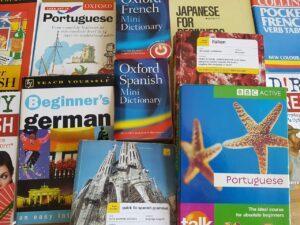Estimated reading time 3 minutes
Table of Contents
Introducing Positives to Dyslexia - Everything is Connected to Everything Else
Do you want to know some of the positives to having dyslexia? Does all information seem connected to you? Global thinking is the capacity to see cohesive relationships between different domains of knowledge. It’s also one of the four strengths resulting from dyslexic brain structure. Keep reading to learn the details of how everything being connected to everything else can be a positive aspect of having dyslexia.
This post uses music terms. For definitions, see the Glossary at the end of the article.

Positives to Dyslexia: Famous Dyslexics
As I mentioned above, one of the positives to dyslexia will be the ability to see that everything is connected to everything else. What does this mean? It means that everywhere you look you see how information you learn in one place has a relationship to information you’ve learned in another place.
This type of mental processing has been around a long time as can be seen in this quote by the renaissance painter Leonardo da Vinci:
Learn how to see. Realize that everything connects to everything else. (Goodreads)
What does da Vinci have to do with dyslexia? First, he made #8 on The Gift of Dyslexia’s list of famous dyslexics:
- Hans Christian Andersen
- Harry Belafonte
- Alexander Graham Bell
- George Burns
- Stephen J. Cannell
- Cher
- Winston Churchill
- Leonardo da Vinci
- Walt Disney
- Albert Einstein
- Henry Ford
- Danny Glover
- Whoopi Goldberg
- Bruce Jenner
- William Lear
- Jay Leno
- Greg Louganis
- General George Patton
- Nelson Rockefeller
- Charles Schwab
- Jackie Stewart
- Quentin Tarantino
- Woodrow Wilson
- W.B. Yeats
Second, while people know da Vinci for his contributions to art, science, and engineering, he also had mirror image writing. It turns out that these both come from having a dyslexic brain structure.
Positives to Dyslexia: How Everything is Connected to Everything Else
Are there more positive aspects to dyslexia beyond the ability to see that everything is connected to everything else?
In the book, The Dyslexic Advantage, Brock and Fernette Eide talk about four areas of strength that dyslexics can have:
- “Three-dimensional spatial reasoning and mechanical ability…”
- “The ability to perceive relationships like analogies, metaphors, paradoxes, similarities, differences, implications, gaps, and imbalances…”
- The ability to remember important personal experiences and to understand abstract information in terms of specific examples…”
- “The ability to perceive and take advantage of subtle patterns in complex and constantly shifting systems and data sets” (5).
Not everyone with dyslexia will have all these strengths:
- However, they will each have at least one of the strengths.
- We’ll look at the second strength in today’s post.
Brock and Fernette Eide talk about how one of the dyslexic strengths will be the capacity to identify connections.
- In other words, global thinking allows dyslexics to see both the context and the connectedness in different types of information.
- People with dyslexia seem to have the ability to see these connections because their brains have developed extensively linked, long-reaching neural pathways.
- These pathways, in turn, promote a tendency toward holistic “big picture” thinking which cultivates novel associations between data sets.
This brain organization allows the dyslexic to recombine information in useful, and even unexpected, ways. However, it does so at the expense of being able to handle details quickly and precisely.

Final Thoughts on Positives to Dyslexia - Everything is Connected to Everything Else
The capability to see that everything is connected to everything else is one of the positives to having dyslexia.
- Why? Because it helps with creativity and gaining insight.
- However, it also affects how people with dyslexia will best learn new information.
The Dyslexic Advantage has some advice:
- “Dyslexic learners with prominent [interconnected learning] strengths can be greatly aided in learning by a few simple steps…”
- “Providing overviews and summaries…”
- “Pre-learning key vocabulary…”
- “Providing information about the practical importance and usefulness of material being taught…”
- “Tying in new information with… pre-existing knowledge…”
- “Overview of goals, ‘the big picture’…”
- “Outlining the lesson plan…” (105-106).
This will help people with dyslexia to see how the information all fits together, which will aid in memory retention.
Related Posts:
- Learning Differences and Spatial Ability: Part 1
- Do Visual Spatial Thinkers and Other Neurodivergent Musicians Need to Have Sheet Music Tailored to How They Learn?
- Special Needs Music Success
- Color Coding Music for Success
© 2023 Geoffrey Keith
Join me for in-person or online lessons today!
Glossary
Noun Definition & Meaning (Video Noun Examples & Types of Nouns)
Are you foggy on how the parts of speech work? Do you need a noun definition with examples? To communicate clearly, writers, poets, songwriters, and well just about anybody will need to understand how they work. Keep reading “Noun Definition & Meaning (Video Noun Examples & Types of Nouns)” to learn more. Estimated reading time 2 minutes.
Read MoreSinging Vocal Exercises
Do you want to be able to sing better? Do you need some singing vocal exercises? It doesn’t matter if you want to do opera singing, backing vocals, choir singing, or just want to work on your singing voice. The sing along song tracks will help you improve. Keep reading to learn how they work. Estimated reading time 2 minutes.
Read MoreIs Just Intonation Impractical?
Are you thinking about composing in just intonation? Do you worry that just intonation is impractical? As with any tuning system, just intonation has its strengths and weaknesses. We’ll look at the pros and cons, and when you’ve gone through the post, you can make up your own mind. Read more to help you answer the question, “Is just intonation impractical?” Estimated reading time 4 minutes.
Read MoreWhat’s Assonance and What’s the Best Way to Use it in Writing?
Do you need to know what assonance is? Do you want to know how to use it in your writing? When you write, you need to make each word count. It’s not just the meaning of your words, but also the sound of the words themselves that can impact the feel of your prose, poetry, or songwriting. In addition, assonance opens up more options when you get struck searching for a rhyme. Keep reading “What's Assonance and What’s the Best Way to Use it in Writing?” to learn what it is and how to do it. Estimated reading time 3...
Read More




